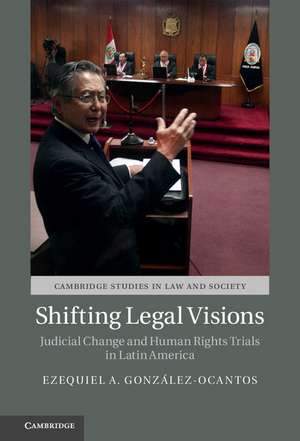Shifting Legal Visions: Judicial Change and Human Rights Trials in Latin America: Cambridge Studies in Law and Society
Autor Ezequiel A. González-Ocantosen Limba Engleză Hardback – 17 aug 2016
| Toate formatele și edițiile | Preț | Express |
|---|---|---|
| Paperback (1) | 288.04 lei 6-8 săpt. | |
| Cambridge University Press – 22 noi 2017 | 288.04 lei 6-8 săpt. | |
| Hardback (1) | 728.56 lei 6-8 săpt. | |
| Cambridge University Press – 17 aug 2016 | 728.56 lei 6-8 săpt. |
Din seria Cambridge Studies in Law and Society
- 9%
 Preț: 661.47 lei
Preț: 661.47 lei -
 Preț: 233.96 lei
Preț: 233.96 lei -
 Preț: 217.08 lei
Preț: 217.08 lei -
 Preț: 290.77 lei
Preț: 290.77 lei -
 Preț: 168.85 lei
Preț: 168.85 lei -
 Preț: 207.99 lei
Preț: 207.99 lei -
 Preț: 169.28 lei
Preț: 169.28 lei -
 Preț: 217.44 lei
Preț: 217.44 lei -
 Preț: 236.96 lei
Preț: 236.96 lei -
 Preț: 318.50 lei
Preț: 318.50 lei -
 Preț: 185.40 lei
Preț: 185.40 lei - 11%
 Preț: 559.13 lei
Preț: 559.13 lei - 9%
 Preț: 694.92 lei
Preț: 694.92 lei -
 Preț: 274.60 lei
Preț: 274.60 lei -
 Preț: 201.39 lei
Preț: 201.39 lei -
 Preț: 289.76 lei
Preț: 289.76 lei -
 Preț: 237.42 lei
Preț: 237.42 lei -
 Preț: 176.91 lei
Preț: 176.91 lei - 9%
 Preț: 695.23 lei
Preț: 695.23 lei -
 Preț: 163.31 lei
Preț: 163.31 lei -
 Preț: 289.76 lei
Preț: 289.76 lei -
 Preț: 279.65 lei
Preț: 279.65 lei -
 Preț: 295.08 lei
Preț: 295.08 lei - 14%
 Preț: 723.92 lei
Preț: 723.92 lei -
 Preț: 392.55 lei
Preț: 392.55 lei -
 Preț: 375.68 lei
Preț: 375.68 lei -
 Preț: 327.30 lei
Preț: 327.30 lei - 14%
 Preț: 725.57 lei
Preț: 725.57 lei -
 Preț: 375.68 lei
Preț: 375.68 lei -
 Preț: 379.07 lei
Preț: 379.07 lei - 11%
 Preț: 689.87 lei
Preț: 689.87 lei - 14%
 Preț: 839.50 lei
Preț: 839.50 lei -
 Preț: 429.12 lei
Preț: 429.12 lei - 11%
 Preț: 694.91 lei
Preț: 694.91 lei - 14%
 Preț: 729.73 lei
Preț: 729.73 lei -
 Preț: 373.56 lei
Preț: 373.56 lei -
 Preț: 422.47 lei
Preț: 422.47 lei - 14%
 Preț: 727.72 lei
Preț: 727.72 lei -
 Preț: 308.12 lei
Preț: 308.12 lei -
 Preț: 398.54 lei
Preț: 398.54 lei - 14%
 Preț: 727.07 lei
Preț: 727.07 lei - 14%
 Preț: 726.42 lei
Preț: 726.42 lei - 14%
 Preț: 781.19 lei
Preț: 781.19 lei - 11%
 Preț: 461.43 lei
Preț: 461.43 lei
Preț: 728.56 lei
Preț vechi: 847.17 lei
-14% Nou
Puncte Express: 1093
Preț estimativ în valută:
139.42€ • 144.68$ • 116.54£
139.42€ • 144.68$ • 116.54£
Carte tipărită la comandă
Livrare economică 17-31 martie
Preluare comenzi: 021 569.72.76
Specificații
ISBN-13: 9781107145238
ISBN-10: 1107145236
Pagini: 342
Ilustrații: 14 b/w illus. 9 tables
Dimensiuni: 158 x 235 x 22 mm
Greutate: 0.63 kg
Editura: Cambridge University Press
Colecția Cambridge University Press
Seria Cambridge Studies in Law and Society
Locul publicării:New York, United States
ISBN-10: 1107145236
Pagini: 342
Ilustrații: 14 b/w illus. 9 tables
Dimensiuni: 158 x 235 x 22 mm
Greutate: 0.63 kg
Editura: Cambridge University Press
Colecția Cambridge University Press
Seria Cambridge Studies in Law and Society
Locul publicării:New York, United States
Cuprins
1. From unresponsive to responsive judiciaries; 2. Legal preferences and strategic litigation: a theory of judicial change; 3. Argentina: pedagogical interventions and replacement strategies in the struggle for human rights; 4. Peru: pedagogical interventions and human rights trials in unfriendly territory; 5. Mexico: an untamed judiciary and the failure of criminal prosecutions; 6. Comparative perspectives on the problem of legal preferences.
Recenzii
'Shifting Legal Visions is a fascinating analysis of how Latin American judges came to hold dictatorial torturers and murderers accountable after years of shielding them from justice. The driving force behind this profound conversion, Ezequiel A. González-Ocantos demonstrates in this carefully designed and richly researched account, was the persistent, strategic effort of human-rights NGO's to teach judges new ways of thinking and ruling. This transformative, path-breaking book will be a must-read for scholars and human-rights organizers alike.' Charles Epp, University of Kansas
'Many transitions to democracy rest on a Faustian bargain with the outgoing repressive regime, formalized in a legal impunity regime. This book explores the work of the human rights activists and organizations that dismantled those impunity regimes in Latin America. They did so in large part, González-Ocantos argues, by changing the way law was understood, educating supportive judges, and removing the intransigent ones. The argument contributes importantly to the literature on comparative judicial politics by paying attention to what is unique about law and courts, without losing sight of their political nature. González-Ocantos brings theories of judicial behavior into conversation with broader institutionalist theories in comparative politics, to produce a deeper, richer theory of institutional change and judicial behavior. The book's focus on ideational as well as strategic motivations brings new understanding to an issue that has become central to the construction of democracy, and pushes forward our thinking about why judges do what they do, especially in the area of transitional justice.' Daniel Brinks, University of Texas, Austin
'… a fascinating comparative study of how Latin American judicial systems have reacted to the efforts of activists to pursue 'strategic litigation' to bring to account those guilty of human-rights abuses. The author focuses on the role of 'legal preferences'. … With a sophisticated comparative research design and impressive documentary and interview-based evidence, the study accounts for variation across and within the cases of Argentina, Mexico, and Peru. The author emphasizes the diffusion of technical know-how and socialization to change norms and identifies in support of rights-based jurisprudence. At the same time, he recognizes the process as a fundamentally political one. Technical expertise about legal remedies from international law can prove inadequate in the face of intransigent judges supporting the old order, and politicians must be pressured to replace them. Identifying the conditions under which 'replacement' supplements 'persuasion' is one of many contributions of this fine book.' Matthew Evangelista, Cornell University, New York
'Many transitions to democracy rest on a Faustian bargain with the outgoing repressive regime, formalized in a legal impunity regime. This book explores the work of the human rights activists and organizations that dismantled those impunity regimes in Latin America. They did so in large part, González-Ocantos argues, by changing the way law was understood, educating supportive judges, and removing the intransigent ones. The argument contributes importantly to the literature on comparative judicial politics by paying attention to what is unique about law and courts, without losing sight of their political nature. González-Ocantos brings theories of judicial behavior into conversation with broader institutionalist theories in comparative politics, to produce a deeper, richer theory of institutional change and judicial behavior. The book's focus on ideational as well as strategic motivations brings new understanding to an issue that has become central to the construction of democracy, and pushes forward our thinking about why judges do what they do, especially in the area of transitional justice.' Daniel Brinks, University of Texas, Austin
'… a fascinating comparative study of how Latin American judicial systems have reacted to the efforts of activists to pursue 'strategic litigation' to bring to account those guilty of human-rights abuses. The author focuses on the role of 'legal preferences'. … With a sophisticated comparative research design and impressive documentary and interview-based evidence, the study accounts for variation across and within the cases of Argentina, Mexico, and Peru. The author emphasizes the diffusion of technical know-how and socialization to change norms and identifies in support of rights-based jurisprudence. At the same time, he recognizes the process as a fundamentally political one. Technical expertise about legal remedies from international law can prove inadequate in the face of intransigent judges supporting the old order, and politicians must be pressured to replace them. Identifying the conditions under which 'replacement' supplements 'persuasion' is one of many contributions of this fine book.' Matthew Evangelista, Cornell University, New York
Notă biografică
Descriere
An in-depth study of processes of judicial transformation that enabled the success of human rights trials in Latin America.

















